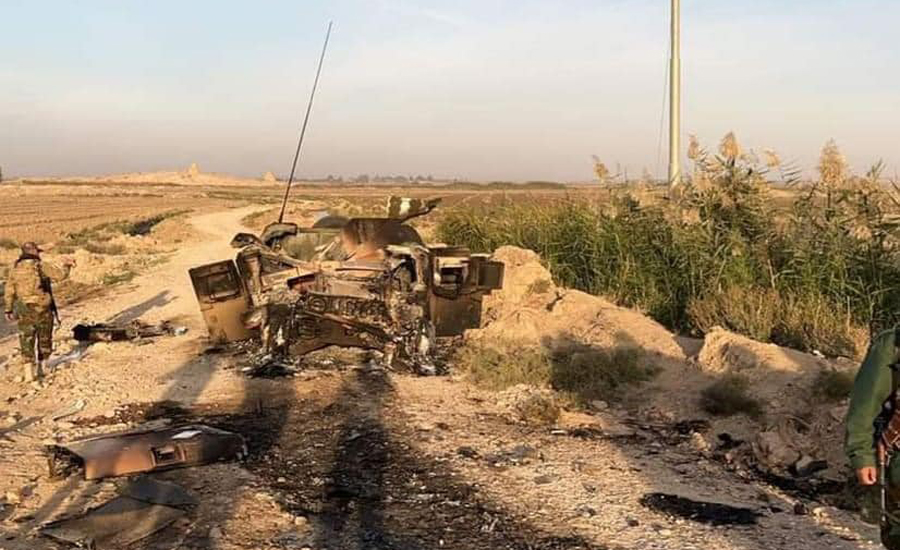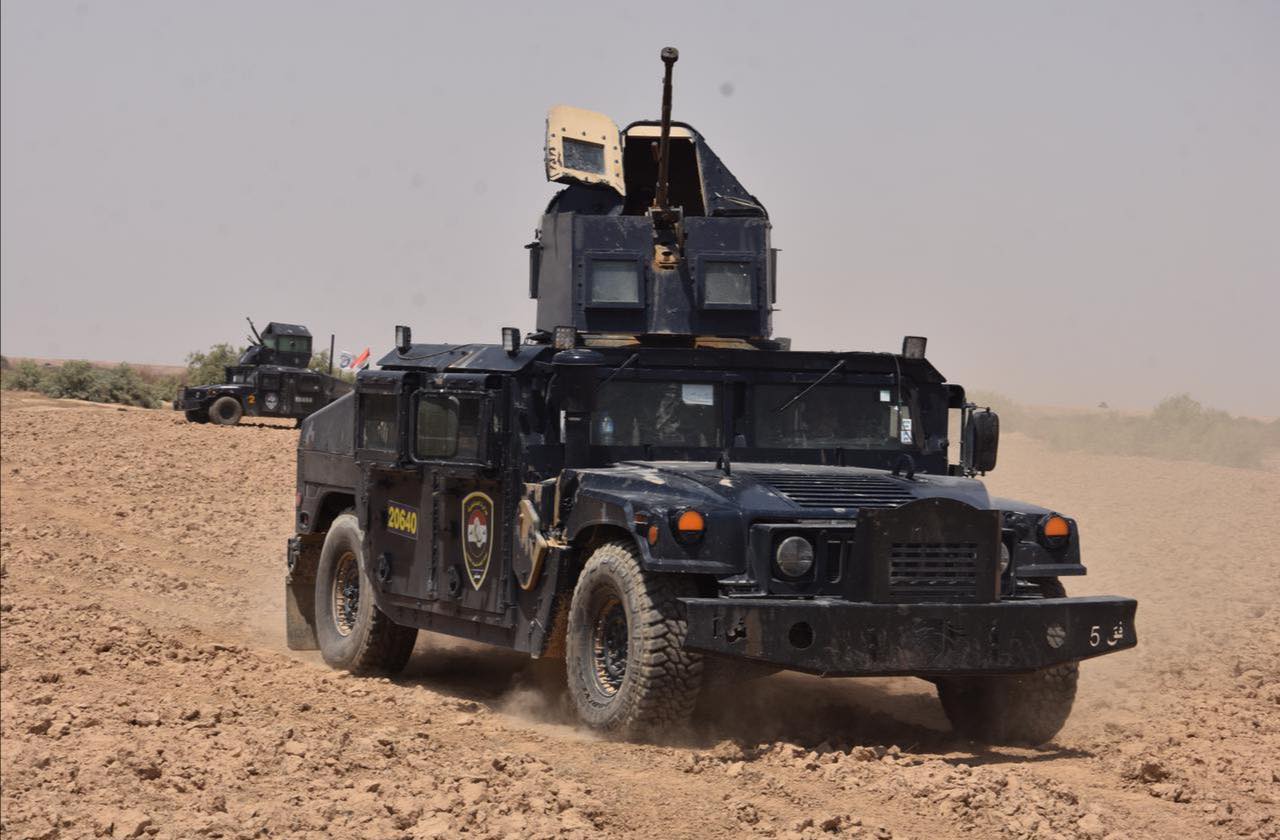Hardly a day passes without the Islamic State in Iraq and Levant ISIL militants launching an attack on the military points in the disputed territories as a result of the hundreds of kilometers of security vacuums and the lack of coordination between the Peshmerga forces of the Kurdistan Regional Government KRG and the security forces of the Iraqi federal government which four years ago declared victory over ISIL.
The last attacks by ISIL militants took place between November 27th to 29th in the district of Kifri, northeast of Baghdad, between Sulaymaniyah and Diyalah where three attacks targeted the Peshmerga forces resulted in the death of eight personnel.
According to (KirkukNow) follow-up, in the past week, over 10 security incidents and armed attacks were launched by the militants in Kirkuk and other disputed territories, according to the security forces.
"There are many security gaps in those areas between the deployment lines of the Peshmerga forces in Khanaqin of Diyala province on the borders with Iran to Sihela in the province of Ninewa near the Syrian borders, with a length of 560 kilometers," Lieutenant general Jabbar Yawar, Secretary General of the KRG’s Ministry of Peshmerga, told KirkukNow.
Yawer said political issues and pressures impede the deployment of the Peshmerga forces alongside the Iraqi army in areas that are considered disputed under Article 140 of the Iraqi constitution, or "what we, the peshmerga and the army call the areas of common importance."
Last month, ISIL gunmen stormed the village of Rashad in Miqdadiya (Sharaban in Kurdish) district northeast of Diyala province. 13 people were killed and seven were injured, stirring up a concerning series of sectarian violence.
The regrouping militants of ISIL have attacked Peshmerga points in Kifri for three successive nights while the Peshmerga senior commanders deny any security gap between the Peshemrga and the Iraqi forces in the disputed territories in Diyala, Kirkuk, Ninewa and Salahaddin.
Sleeper cells and resistant pockets of ISIS militants are regrouping in the rural areas of the disputed territories between Baghdad and Erbil. They are posing a high threat by different tactics such as hit-and-run attacks, kidnappings, IEDs and roadside bombs targeting the Iraqi forces and civilians.

Kifri, November 28th 2021: A Hummer military vehicle carrying seven Peshmerga hit a roadside bomb planted by the armed group and six people burnt to death. Photo circulated on social media platforms.
Following the attacks of Kifri, senior Kurdish officials, including the Iraqi Kurdistan Region IKRP Nechirvan Barzani and KRG PM Masrour Barzani, called for the necessity of strengthening coordination between the Iraqi army and the Peshmerga in order to fill the security voids in the disputed areas between Baghdad and Erbil.
"There are vast security gaps between the concentration lines of the Peshmerga and the federal forces in some areas, especially in Diyala, Kirkuk, Salah al-Din and Erbil, some of which are 40 kilometers deep and 20 kilometers long, so they have become a safe haven for ISIL terrorists," Yawar described the borders.
There are vast security gaps between the concentration lines of the Peshmerga and the federal forces .... some of which are 40 kilometers deep and 20 kilometers long
The Secretary-General of the Ministry of Peshmerga explained that ISIL can also take advantage of these spaces for military training, as well as enter some villages to urge their residents to form clandestine cells in their areas.
The escalation of attacks by ISIL militants in the disputed areas have been going up for years, although the Iraqi government late 2017 announced the complete elimination of that armed group in Iraq.
Major General Tariq al-Asal, a military expert, believes that even if the disputed areas are not under attack, coordination between the Peshmerga and the federal forces is necessary in order to enhance security and stability, given that the federal forces possess more weapons and military equipment beside the air forces.
Al-Asal believes that all, in reference to Bgahdad and Erbil, are exposed to the threats that ISIL poses because the group is active in Hamrin and Kirkuk, especially Hawija, Dibs and Zab, and the areas near the borders of Erbil Northern Province.
"ISIL militants are fighting in the rugged areas that include hills and plateaus where tight security plans have not been taken as before to control them."
The depth of security voids in some areas reaches 40 km and extends to 20 km.
Yawar explained that if security and stability are provided to the residents of those areas, it will be possible to maintain that stability by the residents themselves, but with the current security plan, armed attacks will continue, and in all cases, coordination between the Peshmerga and the federal forces will be necessary, even if peace prevails in Iraq.
Representatives of the Iraqi Ministry of Defense and the Ministry of Peshmerga began months ago talks regarding the formation of two joint brigades with the aim of filling the security gaps between them in the disputed areas.
The Secretary-General of the Ministry of Peshmerga indicated that the agreement of the two sides includes two points, the first is the formation of joint coordination rooms and the second is the formation of two joint brigades in order to deploy them in areas where there is a security vacuum between the Peshmerga and the army, at a time when two brigades cannot fill an area extending for 560 kilometers between the lines of the Peshmerga and the federal forces.
Yawar says the best solution is to have joint military operations in all areas between the Peshmerga and the army so that they can uproot ISIL once and for all.
The figures about ISIL attacks by the ministry of Peshmerga MOP under the Iraqi Kurdistan Regional Government KRG show they have carried out 2412 attacks in the last four years since 2018.
Yawar, told voice of America VOA Kurdish service last month Daesh militants have led 2,412 attacks from 2018 up to last October. About 1742 attacks were carried out in 2018, 270 in 2019, 230 in 2020, and 170 in 2021 up to end of October."

Kirkuk, 2021: A military vehicle in an operation in the southern area of the province. Federal Police media
Security, military and administrative officials in the federal government stressed on more than an occasion the coordination between the army and the Peshmerga in order to confront the threat of ISIL.
The Peshmerga forces had been stationed in most of the disputed areas after ISIL attacks in 2014 until they withdrew following the events of October 16th 2017, when the forces of the federal government imposed their control over those areas due to the worsening relations between Baghdad and Erbil because of the independence referendum by Iraqi Kurdistan Region.
The Peshmerga forces and the army have continued their discussions since then until the two sides reached an agreement in May 2021 to form joint coordination centers in Baghdad, Erbil, Kirkuk, Diyala and several areas of Ninewa province.
The security expert, Asir al-Shara, says that the lack of security in those areas is in the interest of some parties, stressing that it is necessary for the delegations of the Kurdistan Region and Baghdad to reach an understanding and to set up joint military points and have strategic plans to impose security and eliminate the threats of armed groups.
“The formation of joint military convoys must be reached with the participation of the forces of Popular Mobilization Forces PMF and international collation to protect those areas, as they succeeded previously in retaking the areas that were under the control of ISIL.”
Al-Shara called for the unification of the security plans of the federal and the regional governments and to confront threats jointly, because security breaches and acts of violence target both sides.




